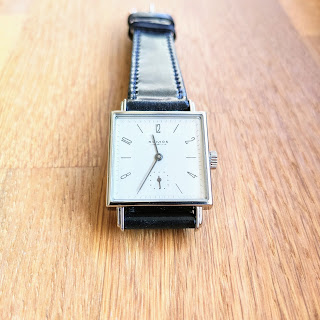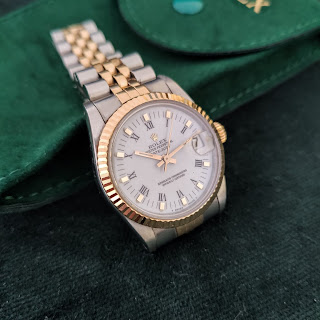7. Wempe Zeitmeister Chronometer | The Pianist
After the young pianist
dramatically plays the last bars of La Campanella, there is a brief silence
which is ruptured by a thunderous applause. The pianist slowly gets up from the
Steinway concert grand model D. At 274
cm in length, the Steinway truly is a majestic musical instrument, a piano
worthy of the next classical music raising star such as him. The pianist, with his left hand still on the
piano, as if the instrument was an extension of his body, bows deeply for this affectionate
reception. As he is basking in the ovation,
he carefully surveys the large crowd at the Semperoper, when he notices a man
getting up to leave, amidst the continuing applause. The presenter, a
representative of the luxury watch chain Wempe, comes on stage to greet the
pianist. The audience finally quiets down, the presenter, an attractive and
stylish woman in her forties, extends him her hand. The pianist was still following the man’s
movement to the exit when the presenter calls him by name, which jolts
him. She congratulates him for his performance
and hands him the Classical Music Raising Star Award which the company is
sponsoring. At 22, he's the youngest recipient so far for this prestigious
award, she points out, a comment which draws more applause of approval from the
audience. The presenter opens an elegant watch case in piano black
finish, which perfectly complements the Steinway, to reveal a simple yet
stately looking silver dress watch with roman numerals on a white dial.
In addition to the award, she is presenting the pianist with one of the
company’s own line of watches, the Zeitmeister Chronometer.
Later at the event
reception, over champagne, the presenter asks the pianist whether he likes the
watch. He replies affirmatively and asks
her, ‘what exactly is a chronometer?’ ‘A chronometer’, she patiently explains, ‘is a
specific type of mechanical watch tested and certified to meet the most
stringent precision standards. Most of our watches at Wempe, are certified
chronometers - German chronometers’, she points out. She adds, ‘German chronometers, in addition
to being actually certified in Germany, are subject to more rigorous tests
compared to the Swiss, which naturally makes them more exact’.
It is as if the word ‘exact’ had a hypnotic effect,
the pianist’s mind drifts back to a day almost two decades ago when he was
still a young boy, about 6 years old. His morning routine is still vivid in his
mind. He remembers that he would start
practice at 6 in the morning. Awakened by his alarm, he would tiredly get up from
his bed to pull up the blinds. Still groggy from sleep, he would drag
himself downstairs in a quiet house, goes to the kitchen to fill a glass with
water and gulp it down. Finally he would settle at the piano, collect himself
for a moment, and begin his the first part of his daily practice. On this particular day, he remembers starting
with his new piece, La Campanella. From the rattling sounds of keys, the
pianist knew his father is home from the local bakery, having bought rolls for
breakfast. His father was pleased to hear the pianist already practicing. Still holding the breakfast rolls, he walked towards
the piano, which was just a used upright.
The pianist continued to play, without looking up, while his father
stood next to him, neither of them acknowledging each other’s presence. His
father knew that the piece was difficult for the pianist, as gifted as he was, his
hands just weren’t big enough for some of the Liszt’s technical demands. But
he insisted, and as he closed his eyes to listen, he was pleased with the
pianist’s progress. Suddenly he opened his eyes and angrily slapped the pianist
in the face. The pianist didn’t dare look at him. ‘Do you know what you
did wrong?’ his father demanded. ‘Yes’,
the pianist replied, holding back tears. ‘What is it then?’ his father calmly
asked. ‘I didn’t hold the tempo’, the pianist replied, still keeping his head
down, fearful of letting his father see his tears, which were beginning to fill
his eyes. His father lowered his head, put his face in front the pianist’s, and
growled ‘if you knew it, then why didn’t you do? Use the metronome!’ It was
then that the pianist’s mother entered the room and demanded to know what was
going on when she noticed the pianist’s red cheek. His mother was furious
for they had agreed that neither of them would ever physically punish the
child. The father brushed her concerns aside, and demanded the pianist to
continue practice, despite protest from his wife, who sat down next to the
pianist. Sobbing, the pianist continued his practice.
His father would take his coffee and go out to the backyard
to smoke, deep in thoughts after such fights, which were regular occurrences.
The pianist’s parents eventually separated when
he was in his teens. Their divorce came
as no surprise, what was unexpected, was that the pianist chose to live with
his father, a decision which was deeply hurtful to his mother as she thought
she had been protecting him and therefore deserved his loyalty. The pianist didn’t take this decision
lightly, as much as he loved her, he knew his mother wouldn’t be able to give
him the support and structure he needed to become a world class pianist, as her
ideas of happiness and success did not align with his. He had unknowingly become his father’s son,
for his ideals had morphed with his father’s, after all the years he’s spent under
his tutelage.
As the pianist grew older, he began to shine on
the international competition stage, winning first prizes at major events, full-filling
the potential that his father had always seen in him. Though still pained by
past memories, the pianist is nevertheless thankful of the path that his father
had rightly chosen for him. Although he might never be able to verbally tell
his father that, for their relationship was not and never will be one that is
outwardly affectionate. It is enough,
the pianist thought, to know that his father is proud of him, by those tears of
joy and pride which he tried to hide as he got up to leave.




Comments
Post a Comment
Thanks for your feedback!